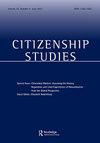The rise of reparative citizenship
IF 1.9
3区 社会学
Q3 POLITICAL SCIENCE
引用次数: 0
Abstract
ABSTRACT Over the past twenty-five years, a growing number of European countries have enacted laws granting citizenship to individuals and their descendants unjustly excluded in the past. These ‘reparative citizenship’ initiatives employ citizenship as a remedy and apology for historical exclusion. This essay argues that such initiatives have the potential to shift conceptions of citizenship. Instead of a privilege to be conferred at the sole discretion of the sovereign state, citizenship may become a status owed for reasons of corrective and distributive justice. Yet it is telling that reparative citizenship has thus far been granted sparingly, acknowledging the wrongful exclusions only of some groups and not others. Also significant is the near total absence of reparative citizenship initiatives in the United States. These limits suggest that despite its transformative potential, thus far reparative citizenship remains the exception that proves the rule.补偿性公民身份的兴起
摘要在过去的25年里,越来越多的欧洲国家颁布了法律,授予过去被不公正地排斥在外的个人及其后代公民身份。这些“修复性公民身份”倡议将公民身份作为对历史排斥的补救和道歉。本文认为,这些举措有可能改变公民观念。公民身份不是由主权国家全权决定授予的特权,而是出于矫正和分配正义的原因而应享有的地位。然而,这说明,到目前为止,修复性公民身份的授予很少,只承认某些群体被错误地排除在外,而不承认其他群体。同样重要的是,美国几乎完全没有补救性的公民身份倡议。这些限制表明,尽管具有变革潜力,但到目前为止,修复性公民身份仍然是证明这一规则的例外。
本文章由计算机程序翻译,如有差异,请以英文原文为准。
求助全文
约1分钟内获得全文
求助全文
来源期刊

Citizenship Studies
POLITICAL SCIENCE-
CiteScore
3.60
自引率
11.10%
发文量
85
期刊介绍:
Citizenship Studies publishes internationally recognised scholarly work on contemporary issues in citizenship, human rights and democratic processes from an interdisciplinary perspective covering the fields of politics, sociology, history and cultural studies. It seeks to lead an international debate on the academic analysis of citizenship, and also aims to cross the division between internal and academic and external public debate. The journal focuses on debates that move beyond conventional notions of citizenship, and treats citizenship as a strategic concept that is central in the analysis of identity, participation, empowerment, human rights and the public interest.
 求助内容:
求助内容: 应助结果提醒方式:
应助结果提醒方式:


